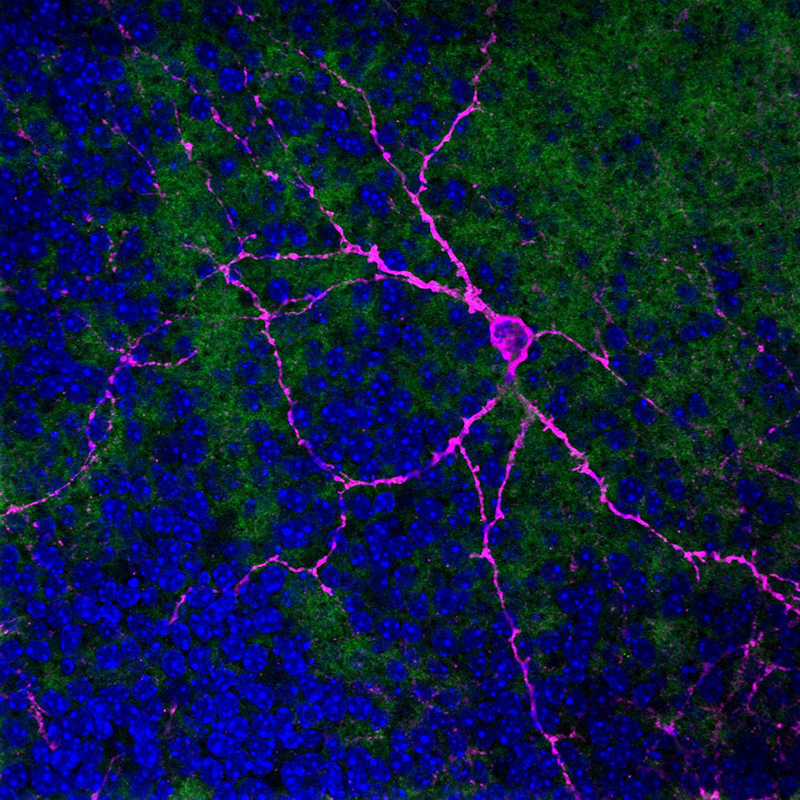The human eye is one of the body’s most important organs. It’s the sense that allows people to navigate their environment by seeing the color, form and shape of the objects around them.
The small organ is the center of attention in research conducted by Katelyn Sondereker, a fourth-year integrated bioscience Ph.D. candidate, who recently received a research grant and fellowship award for her work in analyzing cells in the human eyeball.
Specifically, Sondereker is studying melanopsin ganglion cells, a set of neurons inside the retina involved in regulating sleep patterns and the pupillary light reflex. She is also studying the effects of glaucoma on these cells, as it has been shown that these cells could help people with blindness recover some form of sight. She works in the lab of Dr. Jordan Renna, assistant professor of biology.
“Melanopsin ganglion cells are fascinating to study because they were only discovered about 18 years ago,” said Sondereker. “In the realm of retinal science, that’s pretty recent. There’s not a lot known about them. Anything new discovered about melanopsin ganglion cells and how they’re affected by health and disease is going to be really important.”
VIDEO: Katelyn Sondereker talks about research
Though Sondereker doesn’t study Alzheimer’s disease in particular, studies have shown that melanopsin ganglion cells can be affected by early stages of diseases like Alzheimer’s and glaucoma. But these cells can also be resistant to some retinal diseases, making them an ideal focus for disease-related studies.
Sondereker received the Prevent Blindness 2018 Young Investigator Student Fellowship Award for Female Scholars in Vision Research last July, which came with a $5,000 research grant. Prevent Blindness is the nation’s leading volunteer eye health and safety organization dedicated to fighting blindness and saving sight. In November, she presented the results of her research on melanopsin ganglion cells and how they can assist in the early detection of specific eye diseases such as glaucoma at the Prevent Blindness Ohio Scientific Forum here at the University. This was the first time this particular forum was held on our campus, which is a testament to the amount of invaluable eye research being conducted here.

This image, taken by Katelyn Sondereker with a confocal laser scanning microscope, shows a melanopsin ganglion cell in magenta, surrounded by other cells in the retina.
UA is home to more than 10 biomedically focused research labs actively funded by the National Institutes of Health (NIH). There is a strong group of vision researchers at UA, with a number of labs receiving funding from the National Eye Institute (NEI) for vision research — such as Dr. Jordan Renna, biology, and Dr. Adam Smith, chemistry. Another vision research lab is run by Dr. Rouzbeh Amini, biomedical engineering, who is currently funded by a Bright Focus Foundation grant to develop a tool to measure iris stiffness as an early detector for certain types of glaucoma.
RELATED: Integrated Bioscience Program at UA
While Sondereker doesn’t have a personal connection to blindness or blighted vision, she is excited to be involved in research that has the potential to impact human health. Her original plan after her undergraduate career at UA was to go to medical or physician assistant school. After volunteering in the research lab of Dr. J.J. Ramirez, biology, she realized she had a strong interest in research. Sondereker turned to Renna, with whom she previously had a neuroscience class. He offered a different path – graduate school.
“I never once thought I would try graduate school,” Sondereker said. “It opened up this door to something I never thought I would do.”
After she graduates in May 2020 with a Ph.D. in Integrated Bioscience, Sondereker is looking to find a home in a different lab as a postdoctoral student, where she will conduct more research before pursuing other science-related career opportunities.
Media contact: Alex Knisely, 330-972-6477 or aknisely@uakron.edu.
